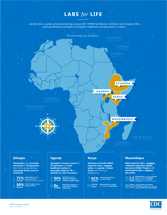Expanding Quality Care and Treatment
Public Health Impact: HIV Care and Treatment
CDC is putting HIV-positive people on treatment that saves lives and prevents transmission of the HIV virus. This helps communities impacted by HIV/AIDS and supports a more stable political, societal and economic environment. CDC, through PEPFAR, has helped support the following:
* As of September 30, 2014
**FY 2014
SOURCE - PEPFAR
CDC is expanding global HIV/AIDS care and treatment services to save lives and prevent new infections
Care and treatment services help prevent new HIV infections, save lives, and provide hope to people and countries crippled with HIV/AIDS. As a key partner agency for the U.S. President’s Emergency Plan for AIDS Relief (PEPFAR), CDC helps countries plan, implement, and evaluate clinical services for HIV/AIDS care and treatment. These services include innovative approaches targeting hard-to-reach and most-at-risk populations.
CDC also works to leverage PEPFAR resources by linking them to other mainstream healthcare services. This integrated health care approach strengthens a country’s entire health care system as well as HIV service delivery effectiveness, efficiency, and sustainability.
Scientific and technical expertise to strengthen and expand HIV care and treatment services
CDC works with Ministries of Health and other key partners to ensure that HIV/AIDS care and treatment services are high quality, cost effective, and reach HIV positive populations by:
Providing ongoing technical expertise through CDC’s unique workforce of highly trained clinicians, epidemiologists, public health advisors, and health scientists.
Identifying, evaluating, and replicating innovative interventions that are low-cost, high impact approaches to service delivery. CDC also links HIV services to other healthcare services to strengthen a country’s entire health care system.
Critical leadership for transitioning sustainable laboratory systems and services to local country ownership
CDC collaborates with Ministries of Health and other key partners to increase country ownership and sustainability of care and treatment programs by:
Transitioning care and treatment programs to local organizations while strengthening capacity and ensuring quality service delivery by leveraging CDC’s in-country presence and highly skilled staff.
Strengthening the health workforce in countries to provide HIV care and treatment, including improving and expanding education to produce more physicians, nurses, laboratorians, counselors, and pharmacitsts, and helping develop national standardized training programs to improve the quality of health workers already in the workforce (e.g., pediatrics, new treatment protocols, and TB).
Notable Accomplishments
CDC and the Health Resources and Services Administration (HRSA) initiated the Track 1.0 program in 2004 to rapidly scale-up antiretroviral treatment (ART) delivery initially through U.S.-based partners. Since that time, CDC has been working with Ministries of Health to transition HIV/AIDS care and treatment service delivery to local country ownership in 13 countries.
Tuberculosis (TB) is the most common opportunistic infection for people living with HIV and one of the leading causes of death. CDC works with Ministries of Health to expand testing and counseling of TB patients, and collaborates with the World Health Organization to develop and disseminate protocols, training, and policies to improve the integration of HIV and TB services.
CDC-led research led to the development of a novel approach to integrate evidence-based interventions that can help reduce deaths, hospital visits, and illnesses among HIV-positive people and their families. The Basic Care Package bundles high impact, low cost interventions that are easy to implement to minimize the susceptibility of HIV-infected persons to common opportunistic infections.
Labs for Life Infographic:

Get email updates
To receive email updates about this page, enter your email address:
Contact Us:
- Centers for Disease Control and Prevention
1600 Clifton Rd
Atlanta, GA 30333 - 800-CDC-INFO
(800-232-4636)
TTY: (888) 232-6348
24 Hours/Every Day - Contact CDC-INFO
 ShareCompartir
ShareCompartir


